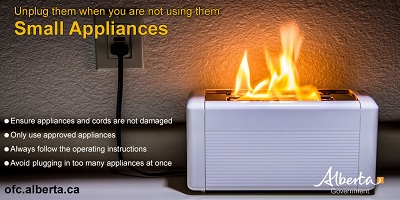 Thursday, April 25, 2024
Thursday, April 25, 2024  Thursday, April 25, 2024
Thursday, April 25, 2024 
When it comes to small appliances, there’s a golden rule for ensuring they don’t start a fire in your home – unplug them when you are not using them.
That’s especially true with any appliance that produces heat, including toasters, toaster ovens, microwave ovens, hair dryers, portable dishwashers and electric kettles.
You should also be vigilant about appliances when they are in use. Appliances with automatic turn-offs, for instance, may malfunction as they age. Instead of shutting down when they should, they will continue to heat up and start a fire.
With thousands of residential fires sparked each year by small appliances, we’ve compiled some other tips to help keep your home safe.
Courtesy of:
Kevan D. Jess
Fire Commissioner
Community and Technical Support
Alberta Municipal Affairs
Public Safety Division